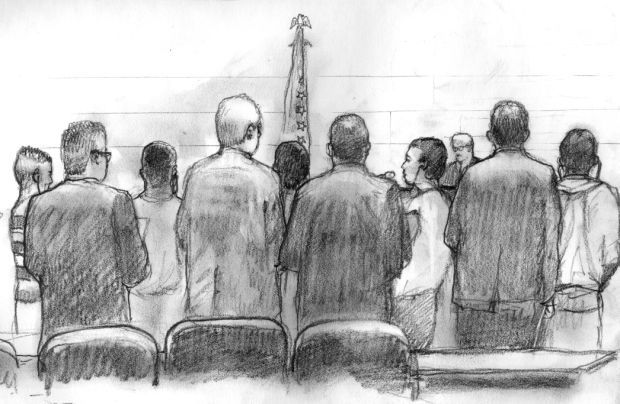Results 11 to 12 of 12
Thread Information
Users Browsing this Thread
There are currently 1 users browsing this thread. (0 members and 1 guests)
Threaded View
-
06-29-2017, 08:49 PM #1
Criminal charges for illegals first time caught crossing the border illegally
Trump immigration policies take root in Tucson federal court
- By Curt Prendergast Arizona Daily Star
- June 29, 2017 Updated 1 hr ago
A fast-track prosecution program is growing as the Trump administration’s immigration policies take root at the federal courthouse in Tucson.
Under Operation Streamline, defendants accept plea agreements and get sentenced — all within a few hours.
- Lawrence Gipe 2013
In a reversal of Obama administration policy, federal prosecutors with Operation Streamline are filing criminal charges against migrants the first time they are caught crossing the border illegally.
For the past several years, Streamline prosecutions were focused on people caught multiple times, defense lawyers said this week. However, first-time offenders were regularly prosecuted for a few years after Streamline was established in Tucson in 2008.
The newest policy change began several weeks ago and followed memos from U.S. Attorney General Jeff Sessions directing prosecutors to find ways to deter “first-time improper entrants.”
The change also came after Streamline prosecutions in Tucson dwindled in the past year from about 70 each weekday to barely a handful, defense lawyers said. Prosecutions of those caught the first time, who lawyers said used to be returned to their country of origin, are helping raise the volume of cases.
First-time crossers make up an increasingly large portion of Border Patrol apprehensions in the agency’s Tucson Sector, according to fingerprint identification records provided by the Border Patrol. The portion of Tucson sector apprehensions involving repeat offenders dropped from 45 percent in fiscal year 2000 to 15 percent in fiscal year 2015, when agents made a total of 64,000 apprehensions.
“Before, so many people with previous deportations qualified (for Streamline), that first-timers were arrested and voluntarily returned,” said defense lawyer Homero Torralba.
“The number of people with previous deportations is way down,” he said, adding that he saw a “real dip about three months ago” in the volume of Streamline cases.
At a Streamline hearing on Tuesday, a dozen lawyers flitted among the 48 men and five women accused of crossing the border illegally. Hours earlier, the defendants had pleaded guilty to illegal entry. They faced a maximum sentence of six months and a $5,000 fine.
More than half of the defendants on Tuesday were first-time offenders who were caught by the Border Patrol several days before. On Wednesday, 24 illegal border crossers who were caught for the first time and 14 who were caught multiple times were sentenced.
Magistrate Judge Bruce G. MacDonald on Tuesday and Wednesday waived the fine for all the first-time offenders, sentenced them to time served, and wished them good luck.
However, he warned them that the misdemeanor conviction was a mark on their record and if they were caught crossing the border illegally again, they would face a felony prosecution and years in prison.
In general, other judges also are sentencing first-time defendants to time served, said Grant Bashore, an assistant federal public defender.
The rest of the defendants on Tuesday and Wednesday were charged with both illegal entry and illegal re-entry, due to previous deportations. As has happened in Streamline cases for several years, they pleaded guilty to the illegal entry charge — which is a misdemeanor — and the judge dismissed the felony re-entry charge. They received sentences ranging from 30 days to the program’s maximum 180 days.
Thousands of illegal immigrants have been sentenced through Streamline, but exact numbers are unavailable. Over the course of several weeks of Arizona Daily Star inquiries, the federal court system referred questions to the Department of Justice, which referred them to the Border Patrol, which referred them to the Department of Justice.
The U.S. Attorney’s Office for Arizona could not be reached and the Border Patrol did not respond to a request for comment.
Prosecuting first-time crossers is a return to the original operation of the program in Tucson. The priorities shifted under the Obama administration and Streamline defendants generally were those who had been deported previously and faced a felony charge of illegal re-entry. In some cases, first-time offenders with serious criminal histories also were included.
http://tucson.com/news/local/trump-i...0249a05f0.html
NO AMNESTY
Don't reward the criminal actions of millions of illegal aliens by giving them citizenship.
Sign in and post comments here.
Please support our fight against illegal immigration by joining ALIPAC's email alerts here https://eepurl.com/cktGTn
Similar Threads
-
LEBANESE NATIONAL CAUGHT CROSSING ILLEGALLY OVER U.S. NORTHERN BORDER
By JohnDoe2 in forum General DiscussionReplies: 1Last Post: 09-10-2014, 09:59 PM -
Man Wanted for War Crimes Caught Crossing Border Illegally from Canada
By Newmexican in forum illegal immigration News Stories & ReportsReplies: 0Last Post: 08-15-2014, 10:42 AM -
SoCal Navy Base to House Children Caught Illegally Crossing Border
By Jean in forum illegal immigration News Stories & ReportsReplies: 0Last Post: 06-03-2014, 10:03 PM -
Feds: Molester caught crossing border illegally
By JohnDoe2 in forum illegal immigration News Stories & ReportsReplies: 1Last Post: 12-06-2011, 01:43 AM -
Iraqi family caught in Texas crossing border illegally
By Jean in forum illegal immigration News Stories & ReportsReplies: 9Last Post: 01-31-2007, 01:40 AM


 35Likes
35Likes LinkBack URL
LinkBack URL About LinkBacks
About LinkBacks






 Reply With Quote
Reply With Quote


Democratic town furious over migrant shelter opening in...
05-19-2024, 09:31 AM in illegal immigration News Stories & Reports